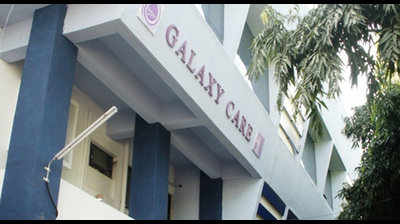Trending
This story is from May 19, 2017
Pune doctors successfully perform country's first uterus transplant
A woman, who suffered from congenital absence of uterus since birth, was fitted with her mother's womb so that she can conceive normally. The surgery has opened up another way to motherhood besides surrogacy or adoption for Indian women who do not have a uterus.

Galaxy Care Laparoscopy Institute .
Key Highlights
- A woman, who suffered from congenital absence of uterus since birth, was fitted with her mother's womb so that she can conceive normally
- The surgery has opened up another way to motherhood besides surrogacy or adoption for Indian women who do not have a uterus
PUNE: A team of city doctors successfully performed country's first womb (uterus) transplant on a 21-year-old Solapur woman on Thursday.
The woman, who suffers from congenital absence of uterus since birth, was fitted with her mother's womb so that she can conceive normally.
The minimally invasive retrieval of the womb carried out mainly through key hole surgery and its subsequent transplant performed only through open surgery took nine hours.
The surgery has opened up another way to motherhood besides surrogacy or adoption for Indian women who do not have a uterus, or who have a uterus that does not function.
"The surgery has been successful. The condition of the recipient and donor is stable. Another 48 hours will be crucial in determining the outcome the surgery,” said oncosurgeon Shailesh Puntambekar who performed the surgery along with team of 11 other doctors.
The complicated surgery took nine hours. “Around 80 percent of the retrieval of organ (uterus) was done laparoscopically and only towards the tail end of the surgery when we had to take out the organ (womb) from donor's body that we adopted open surgery method by taking a small incision so that vessels supplying blood to the uterus are not squeezed and damaged,” Puntambekar said.
Since the majority of the retrieval part was done through minimally invasive key hole surgery medically known as laparoscopic surgery, the donor did not even require blood transfusion.
The woman, who suffers from congenital absence of uterus since birth, was fitted with her mother's womb so that she can conceive normally.
The minimally invasive retrieval of the womb carried out mainly through key hole surgery and its subsequent transplant performed only through open surgery took nine hours.
The surgery has opened up another way to motherhood besides surrogacy or adoption for Indian women who do not have a uterus, or who have a uterus that does not function.
Pune's Galaxy Care Laparoscopy Institute (GCLI), where the surgery was done, has been granted a licence by the state's Directorate of Health Services to carry out the uterus transplant.
"The surgery has been successful. The condition of the recipient and donor is stable. Another 48 hours will be crucial in determining the outcome the surgery,” said oncosurgeon Shailesh Puntambekar who performed the surgery along with team of 11 other doctors.
The complicated surgery took nine hours. “Around 80 percent of the retrieval of organ (uterus) was done laparoscopically and only towards the tail end of the surgery when we had to take out the organ (womb) from donor's body that we adopted open surgery method by taking a small incision so that vessels supplying blood to the uterus are not squeezed and damaged,” Puntambekar said.
Since the majority of the retrieval part was done through minimally invasive key hole surgery medically known as laparoscopic surgery, the donor did not even require blood transfusion.
End of Article
FOLLOW US ON SOCIAL MEDIA











